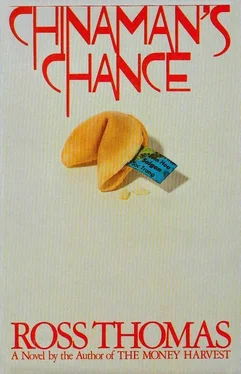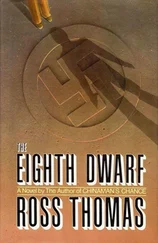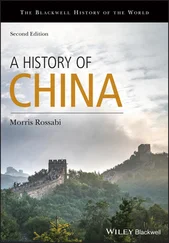“Okay, first the socks. You sit down and cross your knees and you’re wearing short socks and you show a little patch of white, hairy leg and lemme tell you something, there’s nothing nastier looking. I mean nasty. The way it affects some people it’d be better if you took your cock out and waved it around. I don’t know why, but that little white, pasty patch of hairy leg — unless you got just one hell of a tan — looks diseased to most people. So whatever you’re talking about, they’re not gonna be listening. Instead, they’re gonna be thinking about that horrible disease on your leg. Okay?”
“Sure,” McBride said. “Okay.”
“All right, now the shoes. Guess how much they cost?”
McBride looked at them. They were ordinary-looking black low-cut shoes with capped toes — the kind once referred to as Oxfords. McBride decided to go high on his estimate. “Eighty-five bucks,” he said.
Overby shook his head, pleased by his pupil’s low guess. “Two hundred and forty-eight dollars,” Overby said.
“For them?” McBride didn’t believe it.
“Handmade by a little old English guy in Hong Kong. He must be close to a hundred now and he makes ’em just like they did thirty, forty, even fifty years ago. Now what else about ’em, except that they’re kinda ugly?”
“They don’t shine much.”
“They’re not supposed to. They sort of glow, but they don’t shine. The only place shoes are supposed to shine, kid, is in the Marine Corps, although sometimes I like a good spit shine on my loafers. And that’s the other thing — these aren’t loafers. They lace up. Loafers, and boots that zip up, and shoes that buckle, and pimp flash shoes with five-inch heels — well, they indicate a weak moral fiber.”
“A what?”
“A weak moral fiber,” Overby said very seriously. “I mean, if you’re too lazy to lace up your shoes, there’s gotta be something wrong with you.”
“Jesus, Otherguy, I feel I oughta be writing all of this down.”
If it was sarcasm, Overby chose to ignore it. Instead, he put on the dark blue suit that he had held up throughout his lecture. The suit had some very faint gray stripes, and when Overby had it on and its vest buttoned — except for the final button, of course — he looked very much like a smart, hard, tough, prosperous banker from a medium-sized city — which was exactly what he wanted to look like.
“Well, whaddya think, kid?” he said.
McBride examined him carefully. “The suit,” he said finally. “It don’t fit.”
“One size too large,” Overby said. “Like maybe I had the guts and determination to take a little weight off and keep it off, right?”
“Yeah, maybe.”
“So what does that tell you about me?”
McBride nodded slowly. “Yeah, I see, like maybe you’re the kind of guy who does what he sets out to do.”
“Exactly. One size too large. Remember that.”
“What about out there?” McBride said, unconsciously imitating Overby’s westward nod that embraced the entire Pacific. “Is this the way you do it out there too?”
“Not exactly, kid. I’ll have to show you when we get there. But out there,” he said, his voice almost dreamy, “well, out there it’s kind of different.”
As Artie Wu was getting dressed that morning in his bedroom in the house on Ninth Street in Santa Monica, his wife had summoned his children to observe and learn.
“Watch Daddy, darlin’s. He’s puttin’ on his gittin’-outa-here-and-gittin’-us-some-money suit.” Agnes Wu had expertly copied both the voice and the admonition from the wife of an Anadarko, Oklahoma, tool pusher whom she had known in Aberdeen.
It was a resplendent outfit that was intended to be noticed, and Solly Gesini noticed it immediately and the man it clothed as soon as Artie Wu climbed out of Durant’s Mercedes coupe.
Jesus, Gesini thought, it’s gotta he the Chinaman. And the other guy, the skinny one, must be Durant.
The cream-colored raw-silk suit and its double-breasted vest with black silk piping fitted Wu to perfection. Stretched across the enormous mound of stomach, made even more pronounced by the vest, was a heavy gold watch chain. Wu’s glistening white shirt had been hand tailored in Singapore out of handkerchief linen with a high, rounded, almost Hoover-like collar. His tie was severely narrow and no-nonsense black. Dash, if that, indeed, were needed, was supplied by the black-banded Panama hat with the enormous brim turned down all the way around.
“Hell, Artie,” Durant had said when he picked Wu up that morning, “you forgot your ivory-handled fly whisk.”
It was a little after nine when Wu and Durant got out of the Mercedes, which they had parked in a two-hour meter zone on Seashore Drive across from the Sandpiper Apartments.
As they jaywalked across the street, Wu glanced at the fat gold watch that he kept tucked away in a vest pocket. “We’re going to miss Otherguy,” he said.
“He doesn’t need any last-minute advice.”
“No,” Wu agreed. “Not him.”
“But McBride?”
Wu shrugged. “We’ll see.”
McBride, after his early-morning lecture by Overby, was visibly impressed by Wu’s attire when he let the two men into apartment 1229. He studied it all for several moments, trying to decide who Wu was supposed to be. He had no trouble with Durant in his conservative lightweight glen plaid with the blue shirt and black knit tie. Durant was exactly what he seemed to be: smart, competent, and a little hard. Even, perhaps, a trifle ruthless. But Wu... well, Wu, McBride decided, was something else. So he gave up and asked.
“What the fuck are you supposed to be, Artie?”
Wu smiled and made his eyes become two curved sparkling slits. “Mysterious, knowledgeable, highly intelligent, and a bit eccentric. Mild eccentricity, by the way, inspires confidence.”
“No shit?”
“No shit.” He turned to Durant. “You want to call him?”
Durant glanced at his watch. “Okay.” He went over to the phone, dialed I number, and asked for Chief Oscar Ploughman.
Lt. Marion Lake of Homicide watched as Ploughman let his private outside line ring twice. Then the police chief said, “This has gotta be them,” picked up the phone at the end of the third ring, and said hello. When Durant asked for Chief Ploughman, the chief said, “You’ve got him.”
“This is Durant. You said for us to call.”
“I’m going to give you all I can,” Ploughman said.
“All right.”
“Breadstone Avenue. Somewhere in between the 2100 and 2300 blocks.”
“That’s all?” Durant said.
“That’s all,” Ploughman said, and hung up. Then he smiled a large, yellow smile and turned to Lt. Lake. “Let’s give ’em until three o’clock.”
“Then?”
“Then you get over there and find out for sure.”
Lt. Lake nodded. “Who do you think I oughta be this time?”
Ploughman thought about it as he studied Lake for several moments. “A reporter,” he said finally. “You do that pretty good.”
When Durant hung up the phone he turned to Eddie McBride. “Okay, here’s what we’ve got. She’s somewhere in the 2100 to 2300 blocks on Breadstone Avenue. And that’s all we’ve got. You know what to do?”
McBride nodded slowly. “I’ve been talking to Otherguy about it. He gave me a lot of ideas. I’ll hit the bars and the stores and dry-cleaning shops and things like that and ask questions.”
“And if you find her?” Wu said.
“I call you guys.”
“Right. Now, we’re going to be at a meeting between one and two-thirty probably. But we’ll be back here after that.”
McBride cleared his throat a little nervously. “How do I look?” he asked, his voice full of self-consciousness.
Читать дальше












